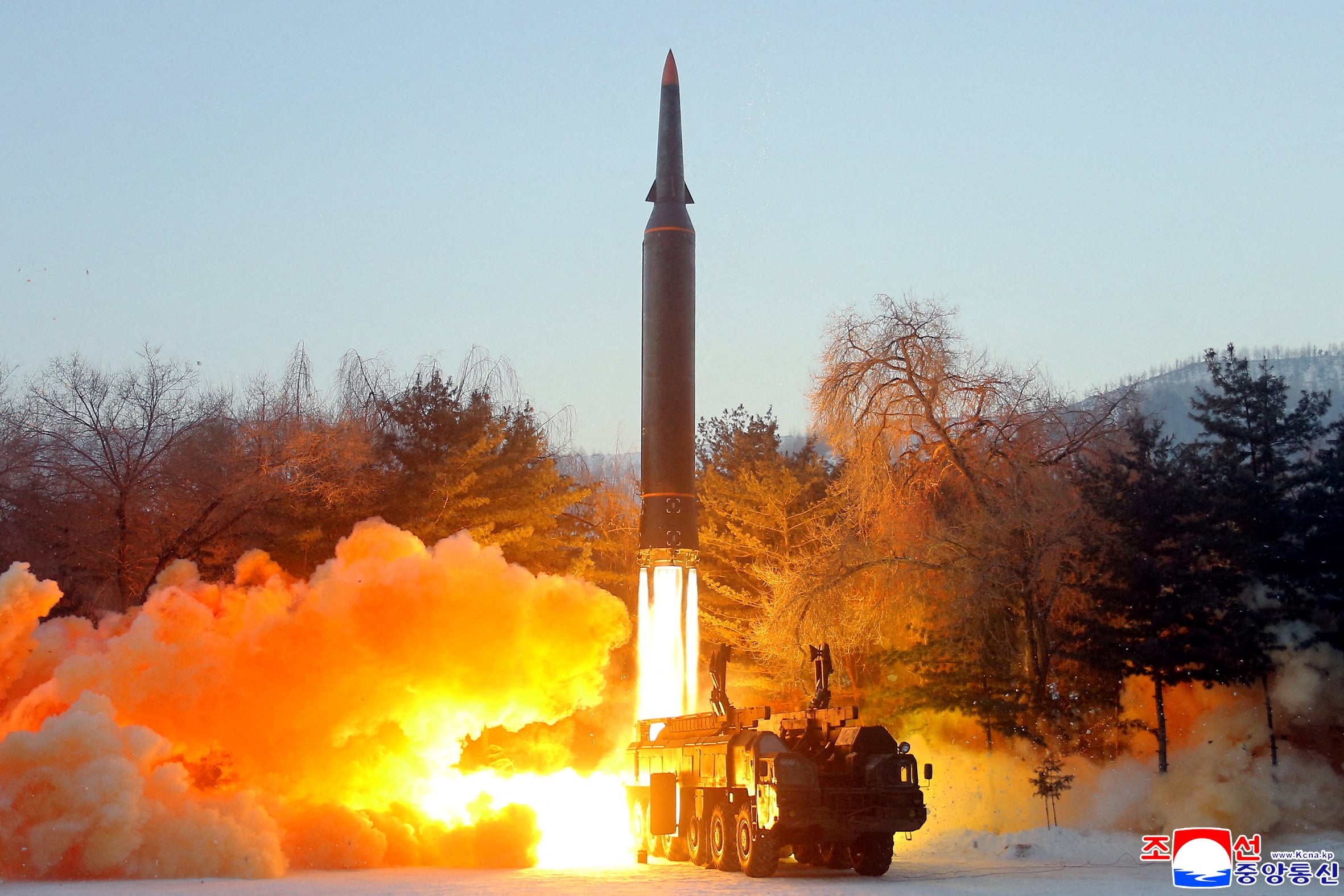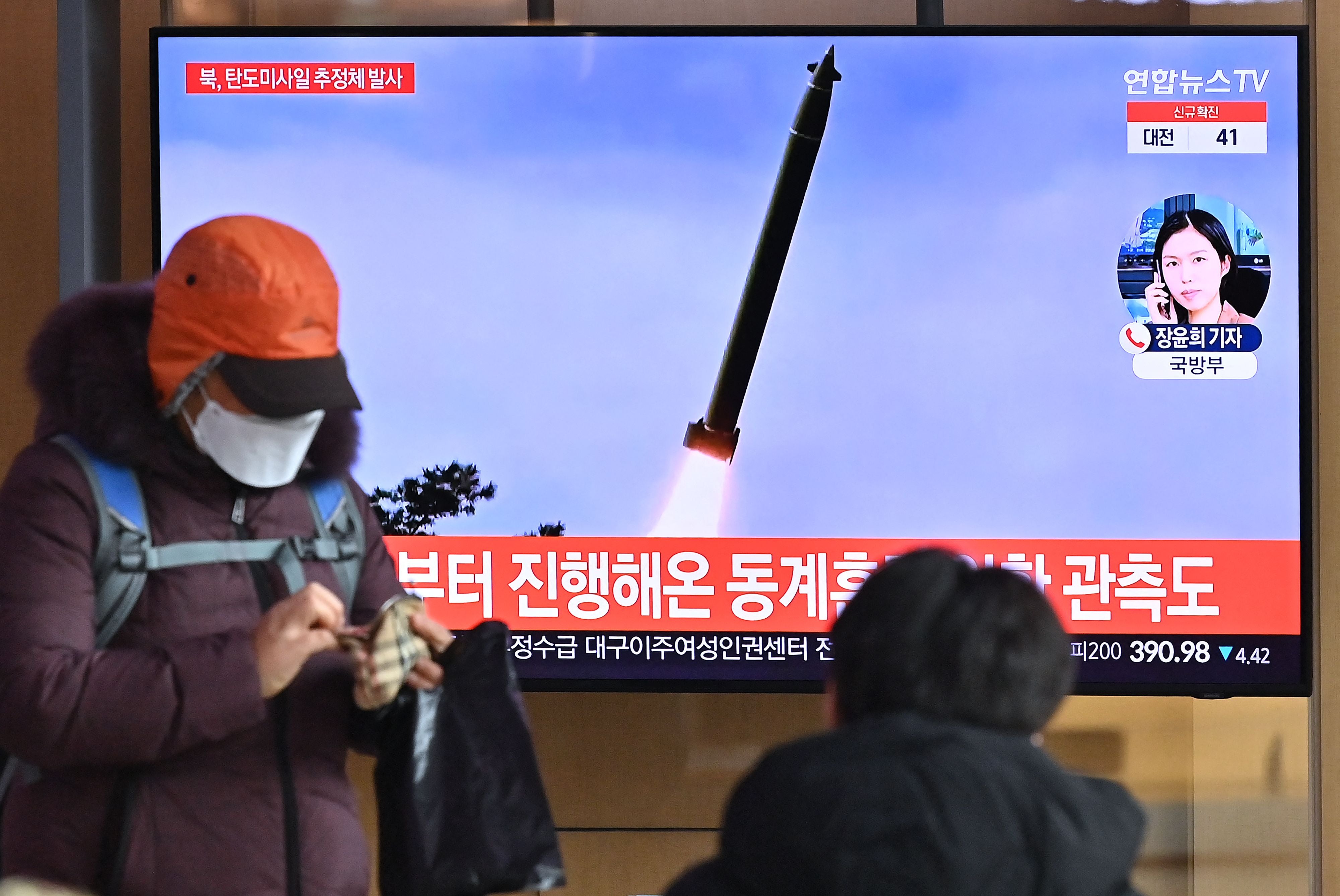North Korea says it successfully test-fired ‘hypersonic missile’
It’s believed to be ballistic missile test in violation of the UNSC ban

Your support helps us to tell the story
This election is still a dead heat, according to most polls. In a fight with such wafer-thin margins, we need reporters on the ground talking to the people Trump and Harris are courting. Your support allows us to keep sending journalists to the story.
The Independent is trusted by 27 million Americans from across the entire political spectrum every month. Unlike many other quality news outlets, we choose not to lock you out of our reporting and analysis with paywalls. But quality journalism must still be paid for.
Help us keep bring these critical stories to light. Your support makes all the difference.
North Korea successfully test-fired a “hypersonic missile” on Wednesday, in its first weapon test this year, confirmed state news agency KCNA.
South Korea’s military, however, claimed North had fired a ballistic missile.
The missile "precisely hit" a target 700 kms away and displayed its "multi-step glide jump flight and strong lateral manoeuvring" capabilities, KCNA said.
The weapon with a new fuel transport system also proved successful in its ability to operate in freezing winter temperatures, it added.
Wednesday’s launch by North Korea was the first since October when it tested a newly developed submarine-launched ballistic missile, in violation of US Security Council resolutions that ban the country from testing ballistic or nuclear devices.
The latest test was detected by several militaries in the region and drew condemnation from governments in neighbouring South Korea and Japan as well as from the US amid stalled talks of denuclearisation.
It was also the second test of hypersonic missiles, which can fly at lower altitudes and evade detection by air defence system for a longer duration than ballistics.
Hypersonics can achieve more than five times the speed of sound - or about 6,200 kms per hour - and analysts say have better manoeuvrability.

“The successive successes in the test launches in the hypersonic missile sector have strategic significance in that they hasten a task for modernising strategic armed force of the state,” the KCNA report said.
The test was first detected by Japan’s coast guards and South Korea’s military on Wednesday before it was confirmed by Pyongyang on Thursday.
Japan’s NHK TV reported that prime minister Fumio Kishida was prompted to create a crisis response centre under his office following the news of the launch.
“It’s truly regrettable that North Korea has repeatedly launched missiles since last year,” Mr Kishida of Japan said on Wednesday. “The Japanese government will strengthen warning and surveillance more than ever.”
The analysts said that the missile appears to be a new liquid-fuelled manoeuvrable reentry vehicle (MARV) ballistic missile which was first unveiled at a defence exhibition in Pyongyang in October.
Ankit Panda, a senior fellow at the Carnegie Endowment for International Peace’s Nuclear Policy Program, said the missile appears to be a different version than the weapon tested last year.
"My impression is that the North Koreans have identified hypersonic gliders as a potentially useful qualitative means to cope with missile defence," he added.
Mr Panda added the missile in Wednesday’s test shares a few commonalities with the Hwasong-8 – North’s first “hypersonic missile” tested in September 2021.
North Korea has not tested nuclear bombs or long-range intercontinental ballistic missiles that could directly threaten the continents like the US since it tested three ICBMs in 2017.
But after the North Korean leader Kim Jong Un’s diplomacy with former president Donald Trump collapsed in 2017 the country has developed a range of more manoeuvrable missiles and warheads capable of countering missile defences like those wielded by South Korea and the US.
The test came days after Mr Kim vowed to bolster the North’s military power and food productivity amid an increasingly unstable military environment in the Korean peninsula in his New Year’s speech.
In a call with Japanese foreign minister Yoshimasa Hayashi on Thursday, US secretary of state Antony Blinken condemned the North Korea missile launch, the US State Department said in a statement.
“We take any new capability seriously, and as we’ve said, we condemn (North Korea‘s) continued testing of ballistic missiles, which are destabilising to the region and to the international community,” a State Department spokesperson said later.
Meanwhile, addressing the concerns, China’s foreign ministry spokesperson Wang Wenbin urged all sides to speak and act cautiously while stressing on the need for “dialogue and consultation, and together work towards moving forward the political settlement of the peninsular question”.
(Additional reporting by agencies)
Join our commenting forum
Join thought-provoking conversations, follow other Independent readers and see their replies
Comments